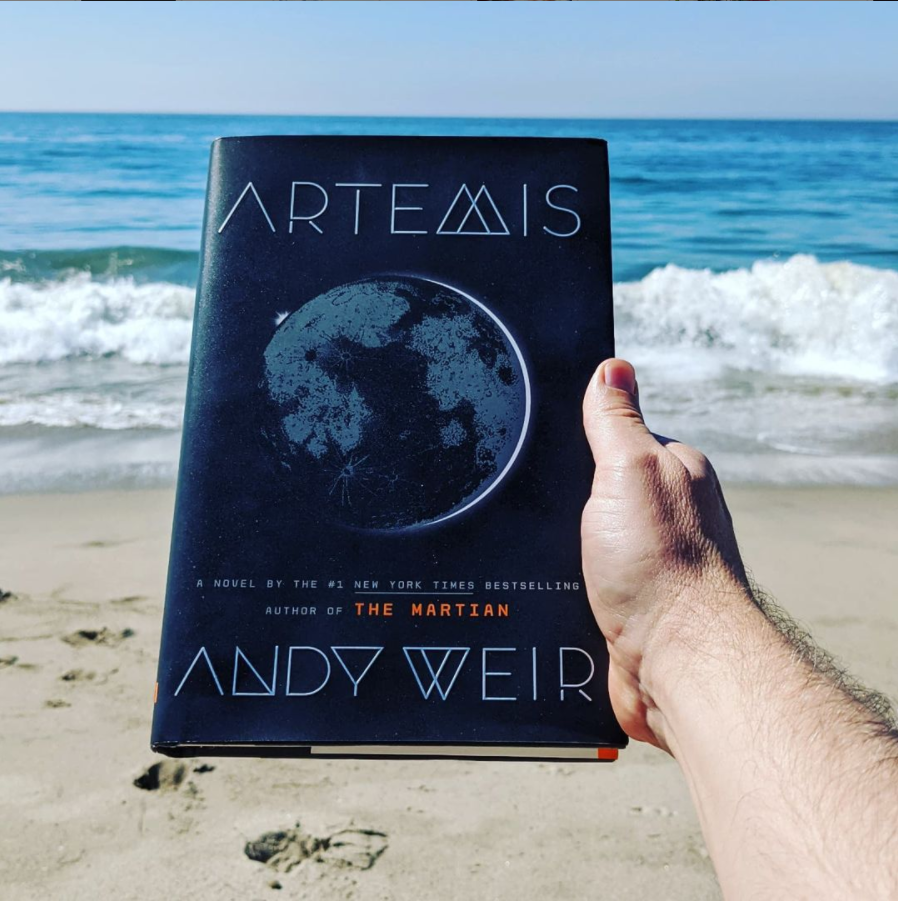In 2014, Andy Weir successfully realized the dream of transitioning from software engineer and science nerd to blockbuster novelist with the Crown Publishing release of The Martian. I loved it. This year, 2021, he published Project Hail Mary, which reminded me that he had published his second novel, Artemis, four years ago and while I own a copy, I still had not read it. I resolved to remedy that. As I have stated previously, I am a slow reader, but I blasted through Artemis in a week during a handful of reading sessions including a particularly relaxing one at the beach.
Andy Weir returns to a first person perspective, this time telling the story as Jasmine, a twentysomething of Saudi descent who was raised on the lunar colony Artemis. Jasmine is intelligent and has great potential, but instead of applying herself in a science or a trade that would benefit the colony, she works as a porter making deliveries much to the disappointment of her father, also a resident of Artemis. Jasmine makes ends meet by moonlighting as a smuggler, a side hustle with particular synergy with her work as a porter. The colony’s lone star of justice, Rudy, has his watchful eyes on Jasmine but has not yet been able to catch her in the act. When Jasmine is offered a dangerous but lucrative assignment by a wealthy benefactor, she jumps at the opportunity. When the job goes bad, she is forced to run for her life, but when you live in an enclosed lunar colony, there aren’t many places to run to.
As in The Martian, Weir’s science explanations are in layman’s terms, allowing people who aren’t NASA geeks (and I use that term with utmost affection) like him to participate in the story and understand the science of lunar colonies. Did you know that while moon dust looks soft and pillowy, it is actually composed of very small balls of spiky rock and if you breathe it, it will shred your lungs? Good safety tip. Weir uses his knowledge and fandom of the history of manned spaceflight and space exploration to craft a believable lunar colony.
Jasmine is headstrong and smart. She has a mouth on her that gets into trouble as often as it gets her out of it. She has quite a bit of baggage that she has not yet unpacked, but it informs her actions, misguided though they may be. What I did not like about Jasmine was the oversexualization of her character. She has a reputation for sleeping around and nearly every interaction she has with a male character includes the topic of sex in some form. At one point in the story, she is trying to obtain some information and dresses like a prostitute to gain access to a restricted area. At another point, she meets a brilliant engineer friend who wants her to test out a new product he has designed. That product is a reusable condom and he has chosen her to test it because he knows she is promiscuous. One or two of these things throughout the novel would have seemed normal, but all of it packed into this three hundred page story felt gratuitous. After the fifth or sixth occurrence, I thought “wow, this is why female readers hate it when men write from a woman’s perspective”. I brought this up to my mother who also read the book and she said she none of it bothered her and suggested Weir was making a point about gender hypocrisy in sexuality.
The story of Artemis is a lot of fun. Whereas The Martian was a survival story, Artemis is a heist caper. While the main chapters tell the story in the first person present, the first half of the novel also includes letters Jasmine wrote to her Earthbound pen pal beginning in childhood and continuing as the two grow into adulthood. These letters help explain more of Jasmine’s state of mind and how her smuggling operation began. I enjoyed these glimpses into her past.
Not as brilliant as Weir’s stunning debut, Artemis is still an entertaining science fiction story. It is an accessible novel that could be enjoyed by people who only read science fiction casually. Even those who enjoy digging into the deep and challenging stories written by hard SF authors like Kim Stanley Robinson will enjoy the lighter themes of Artemis.


